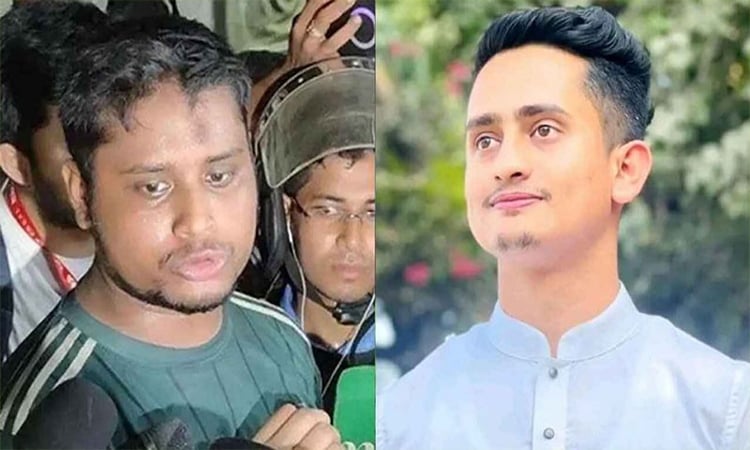News Flash
News Flash

DHAKA, July 26, 2025 (BSS) - The Detective Branch (DB) of police took two more coordinators of the anti-discrimination student movement Sarjis Alam and Hasnat Abdullah into their custody on July 27 last year while the protesters issued a 24-hour ultimatum with three-point demands.
DB Additional Deputy Commissioner Zunaid Alam Sarkar on that day told the reporters that the movement coordinators were taken into DB custody for interrogation over the incidents that took place during the movement and for their own safety.
Earlier, in the afternoon on July 26, three other coordinators Nahid Islam, Asif Mahmud Shojib Bhuyain and Abu Baker Majumdar were also taken to the DB custody.
Besides, that night, the anti-discrimination student movement leaders in an online press conference rejected the gazette notification issued over the quota reform, saying that it didn't reflect the court's ruling or students' original demands.
They issued a 24-hour ultimatum to the government with three fresh demands and warned of announcing tougher programmes if these demands were not met.
The three-point demand included; immediate release of all detained students including movement coordinators, withdrawal of all cases filed against students and taking action against those responsible for killing students.
Speaking at the press conference, one of the movement coordinators Mahin Sarkar said, "The government is claiming that our demands have been met, but our core demand was to form a commission to resolve the issue. That hasn't happened, so we reject the gazette notification."
Another coordinator, Abdul Hannan Masud stated that over 3,000 students were arrested and multiple cases were filed against movement coordinators across the country.
He said they would carry out a combined online and offline public outreach campaigns across the country, submit petitions to foreign embassies and draw graffiti on walls across the country on July 28.
The movement leaders also said that at least 266 people were killed during the protest. They said most of the cases filed against students were fabricated.
The movement leaders announced to form a nationwide "Health Force" involving educational institutions at all levels to prepare a comprehensive list of the people who were killed or injured during the movement and provide financial and psychological assistance to the affected families, and establish a "Legal Force" to document legal cases and ensure legal support for students on July 29.
Earlier, in the afternoon on July 27, a 12-member delegation of the University Teachers' Network visited the DB office to inquire about the detained coordinators. Despite waiting for 15 to 20 minutes, they were not allowed to meet with the senior DB officials.
On the same day, Nobel Laureate Professor Dr Muhammad Yunus, now chief adviser of the interim government, at an interview with The Hindu, an Indian English-language daily, called for a fresh election within a short timeframe to restore democracy.
He also urged the international community to help end the killings in Bangladesh centering the movement demanding quota reform in government jobs.
Besides, former DUCSU VP and Gono Odhikar Parishad President Nurul Haque Nur was picked up from his residence in Hatirjheel in the early hours of July 27 as the law enforcers continued mass arrest across the country.
According to a Dhaka based Bangla daily- Bonik Barta- by July 27 night, over 736 cases had been filed across the country over arson attacks and vandalism during the quota protests. In Dhaka alone, 207 cases were recorded, with 2,536 arrests. An additional 71 were arrested in Dhaka during a RAB operation while the number of total arrest stood at least 7,000 across the country.
On that day, the curfew was relaxed from 8am to 5pm while the Ministry of Public Administration announced that all government, autonomous and private offices would operate from 9am to 3pm from July 28 to July 30.
After holding a meeting at his residence on July 27 night, the deposed Home Minister Asaduzzaman Khan Kamal said that curfew would continue in Dhaka, Gazipur, Narayanganj and Narsingdi districts on July 28, 29 and 30 with a relaxation from 7am to 6pm.
However, the Human Rights Forum Bangladesh (HRFB) expressed concern on the same day over the detention of student coordinators and urged the government to ensure their safety and avoid harassment.
Besides, in a joint letter to the then foreign Minister Hasan Mahmud, 14 foreign missions, the US, the UK, France, Germany, Italy, Spain, Netherlands, Canada, Switzerland, Sweden, Denmark, Norway, Australia and the EU, in Dhaka expressed deep concern and sorrow over the violence and loss of life during the quota reform movement.
Academics, writers and intellectuals associated with international universities also voiced grave concern over the violence in Bangladesh.
In a letter addressed to the UN High Commissioner for Human Rights Volker Turk, more than 140 prominent individuals called for immediate action.
BNP Secretary General Mirza Fakhrul Islam Alamgir urged the government to resign taking the responsibility for killings during the quota reform movement.
"The governments choose the path of barbaric torture to suppress political opponents. Detainees are being tortured in the name of remand to create gossip," he said.
On the same day, several opposition leaders called for the resignation of the then Prime Minister Sheikh Hasina, blaming her for the casualties during the quota reform movement.
Leftist political alliances, including the Left Democratic Alliance, Anti-Fascist Left Alliance and Jatiya Samajtantrik Dal (JaSad), condemned the detention of three coordinators, calling it an "unprecedented and disgraceful act" and demanded their immediate release.
The Communist Party of Bangladesh (CPB) Women Cell, Socialist Women's Forum and seven left-leaning student organizations under the Democratic Student Alliance also echoed the demand.